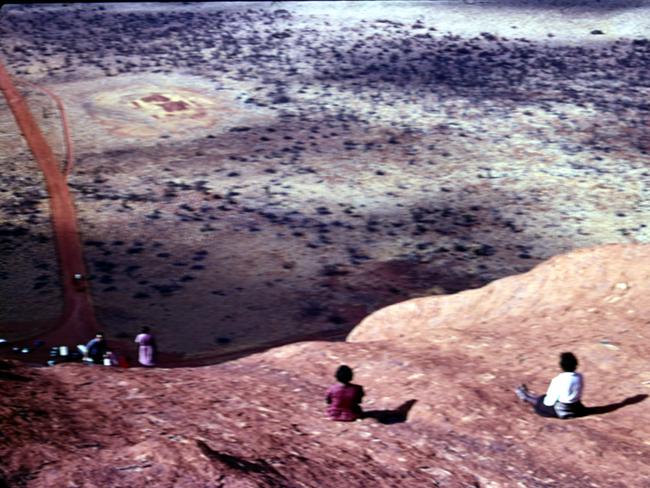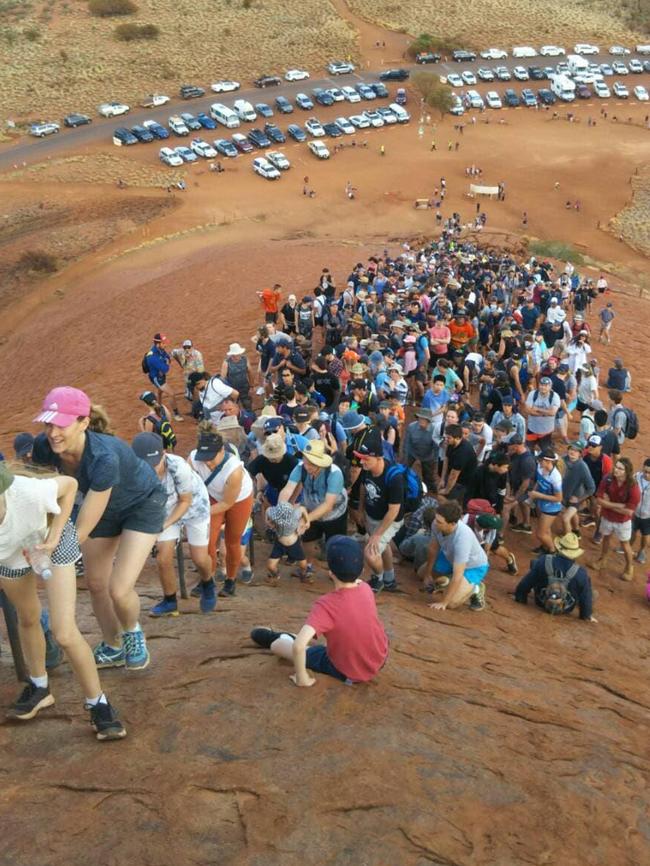‘Whitefellas agenda’ led to Uluru climb ban: Bureaucrats accused of misrepresenting Aboriginal lore
UPDATED: A man who spent a decade working in communities around Uluru has accused whitefellas of misrepresenting Aboriginal lore to push their own agenda to have the rock climb closed

Lifestyle
Don't miss out on the headlines from Lifestyle. Followed categories will be added to My News.
- TREATING Uluru as a toilet ‘contributed to climbing ban’
- INCREDIBLE picture: Hordes rush to climb Uluru before closure
A MAN who spent a decade working in communities around Uluru has accused whitefellas of misrepresenting Aboriginal lore to push their own agenda to have the rock climb closed.
David Hewitt led a party of Aboriginal workers from Docker River who built the first store at the base of Uluru back in 1972.
He said a lot of information being provided about the history of Uluru was “totally inaccurate”.
“From my experience Aboriginal people, certainly to me, have never expressed any concern about people climbing rock, they’ve climbed themselves,” he told Sky News.

“When I was working there in 1972 they were aware of many whitefellas climbing as well as many Aboriginal people and they never expressed any concern and it’s only in recent times, I’d suggest from about 1992, that those concerns have been raised.”
Mr Hewitt still has a collection of photographs taken during his time living and working in communities near Uluru.
They include a photograph of two Aboriginal women sitting on the rock.
Mr Hewitt says the photo was taken in the late 1960s and the women pictured are from Ernabella.
NEW photo of Uluru causes outrage
OPINION: Uluru climbers a conga-line of cretins
“All these ladies would have been either the wives or daughters of traditional owners and there was no concern at that time,” he said.
Mr Hewitt said the push to close the rock climb had been driven by white bureaucrats concerned about the legal and financial ramifications of people being killed or injured on the climb.
“I think the feeling of the park is best expressed in a comment from a senior ranger when we came back to the area after being away for about 15 years,” he said.
JUST $1 a week: OUR best ever, amazingly cheap NT News subscription deal
“We came back in about 1998 and I spoke to one of the rangers then and his comment was, ‘listen here mate, it’s duty of care’, and I think that sums up the whole situation pretty well.”
Uluru-Kata Tjuta park manager Mike Misso disputed Mr Hewitt’s claims.
“We have concerns about people’s safety in climbing Uluru, but in fact the decision to close the climb was based on two key factors, the numbers of people climbing Uluru — so we had an independent study done — but also the advice of traditional owners,” he said.
“So the board took the advice of traditional owners who suggested or recommended to the board that the climb be closed.”
But Mr Hewitt said the cultural significance of the rock had been overstated.
“It suits a lot of people down south to believe that there’s this sort of inflated idea of sacredness, and there certainly are many sacred sites around, but most of them whitefellas don’t know about them because the Aboriginal people aren’t prepared to pass on that information,” he said.
“We do get concerned about all these exaggerated claims made by whitefellas to suit their own beliefs.”
■ WATCH Matt Cunningham’s report on the closure of the rock climb at Uluru in the special episode of Paul Murray Live from Alice Springs. Tonight from 7.30pm on Sky News, Foxtel Ch 600


